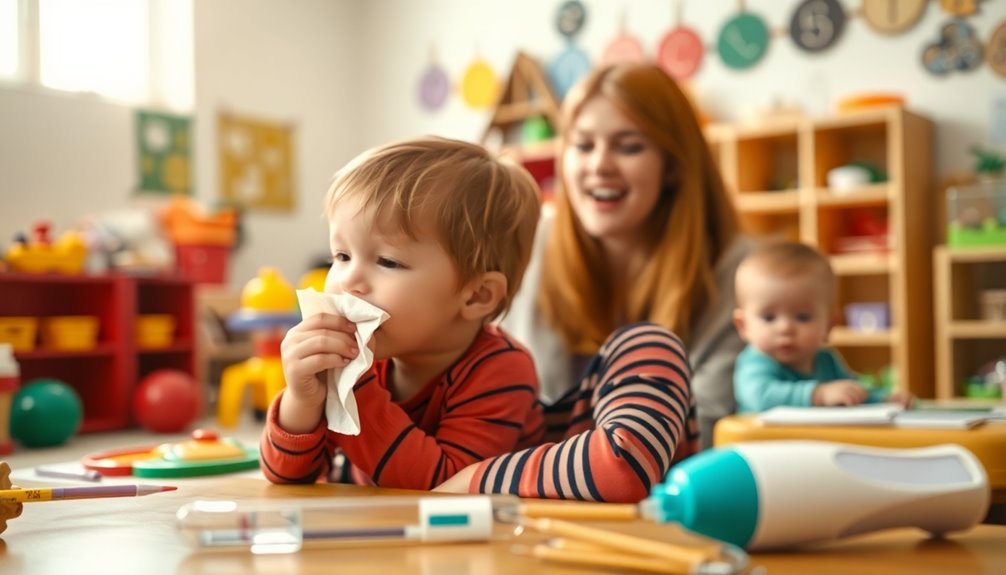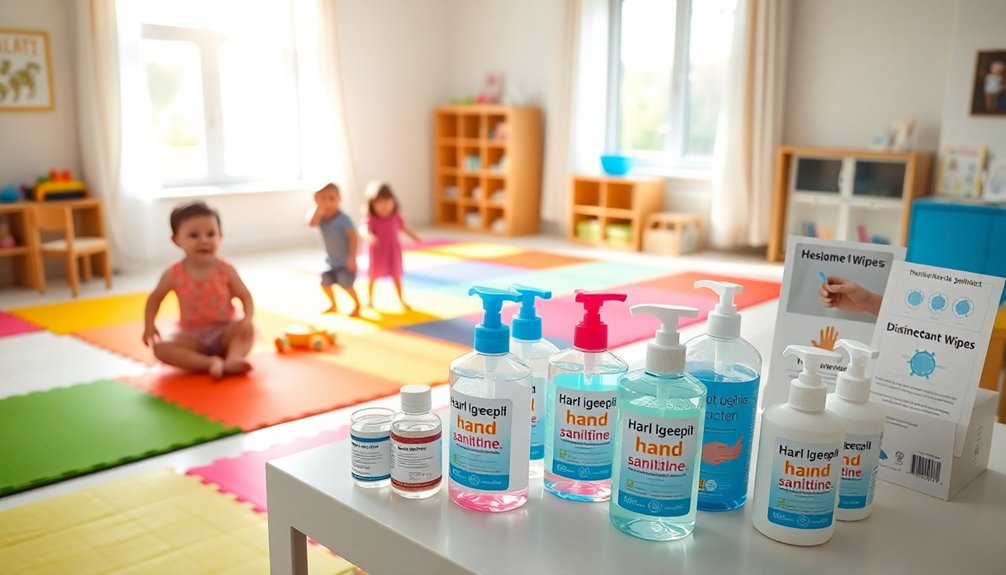Frequent illnesses in daycare can be shocking, with kids averaging five to six colds each year. They face various illnesses, from croup to ear infections and gastrointestinal issues. Embracing the hygiene hypothesis suggests some germ exposure can actually strengthen a child's immune system. To help your child stay healthy, encourage good hygiene, guarantee a nutritious diet, and promote regular sleep. You'll want to learn more about effective strategies to tackle these challenges and keep your little one thriving.
Key Takeaways
- Daycare children experience higher illness rates, averaging five to six colds per year, due to increased germ exposure.
- Implementing regular hand washing and hygiene practices can significantly reduce the spread of illnesses in daycare settings.
- A nutritious diet rich in fruits, vegetables, and high-fiber foods strengthens children's immune systems against frequent illnesses.
- Keeping children up-to-date on vaccinations helps minimize the risk of outbreaks and serious illnesses in daycare environments.
- Establish clear isolation protocols and maintain communication with parents to effectively manage sick children in daycare.
Understanding the Impact of Daycare on Child Health

When you choose daycare for your child, it's important to understand how it can impact their health.
Children in daycare often get sick more frequently than those at home, but this exposure to various germs actually helps strengthen their immune systems. By encountering different illnesses, your child's immune system learns to build antibodies, preparing them for future challenges. Additionally, incorporating high-fiber foods like chia seeds into their diet may further enhance their overall wellness and immune function. The soluble fiber in chia seeds aids digestion and promotes bowel regularity, which is essential for maintaining good health. Moreover, chia seeds are a plant-based source of omega-3 fatty acids, which support brain health and overall wellness. Regular consumption of antioxidant-rich foods can also contribute to a stronger immune response.
The hygiene hypothesis suggests that early exposure to germs is beneficial, aiding in immune system development.
While it's common for daycare kids to average five to six colds a year, remember that illness is a normal part of growing up. Instead of trying to avoid sickness entirely, focus on preventive measures to support your child's health and resilience.
Common Illnesses in Daycare Settings

Many parents notice that their children catch various illnesses while attending daycare. This is largely due to close contact with peers and shared spaces. Kids can get sick frequently, averaging five to six colds a year, with some catching as many as eight. Croup, marked by a barking cough, is another common issue, affecting many kids by age three. Additionally, beet juice may help improve overall health and support the immune system, potentially reducing the frequency of illnesses. Proper nutrition is essential for children's health and can strengthen their immune systems, making them less susceptible to frequent illnesses. Regular pediatric check-ups are important for monitoring developmental milestones, which can help identify any health issues early on. Ear infections are also prevalent, with two per year being typical for children under three, thanks to their shorter eustachian tubes. Additionally, gastrointestinal problems like diarrhea and vomiting arise, with one or two cases of diarrhea per year common in group care settings. Awareness of these issues can help you better prepare for your child's health in daycare. Creating a safe and healthy living environment can significantly reduce the risk of illness.
The Hygiene Hypothesis: Germ Exposure Benefits

Understanding the hygiene hypothesis can be eye-opening for parents concerned about their children's frequent illnesses in daycare. Early germ exposure can actually strengthen your child's immune system, helping them develop antibodies for future protection. While it may seem alarming that daycare kids often get sick, this exposure can lead to better immune development over time. Additionally, children with chronic feelings of emptiness may be more susceptible to emotional dysregulation when facing frequent illnesses. Regular hydration practices can also support overall health and resilience against illness.
| Age | Illness Rate in Daycare Kids | Illness Rate in Home Kids |
|---|---|---|
| 1 year | High | Moderate |
| 2 years | Very High | Moderate |
| 3 years | Equalized | Equalized |
| 4 years | Lower | Lower |
| 5 years | Lower | Lower |
The hygiene hypothesis suggests that overly sanitized environments may hinder your child's immune development, leading to increased susceptibility to allergies later on. Embrace the germ exposure benefits!
Strategies to Strengthen Your Child's Immune System

To effectively boost your child's immune system, focus on a combination of healthy habits and preventive measures.
Start by encouraging regular hand washing, especially before meals and after using the restroom, to prevent the spread of germs. Make sure your child is up-to-date on vaccinations to guard against serious illnesses, reducing the risk of outbreaks in daycare.
Promote a nutritious diet rich in fruits and vegetables to support their overall health. Encourage outdoor play and physical activity, as fresh air and exercise can enhance immune function.
Encourage a diet abundant in fruits and vegetables, along with outdoor play, to boost your child's immune health.
Finally, prioritize hydration, ensuring your child drinks enough fluids to maintain peak health and support their immune responses.
These strategies can make a significant difference in strengthening their immune system.
Promoting Good Hygiene in Child Care Environments

Good hygiene in child care environments is essential for keeping kids healthy and preventing the spread of illnesses.
One of the most important practices is washing hands. Make sure both staff and children wash their hands upon arrival, before and after meals, and after using the toilet or changing diapers.
Provide sinks in every room to make handwashing easy. Keep food preparation areas separate from toilets and diaper-changing stations to uphold hygiene standards.
Use disposable paper towels instead of cloth ones to avoid sharing germs. Regularly sanitize toys that infants and toddlers mouth and clean commonly touched surfaces.
Managing Sick Children in Daycare: Best Practices

When managing sick children in daycare, it's vital to have clear isolation protocols in place.
You should also maintain open communication with parents to guarantee they're aware of their child's condition and can pick them up promptly.
Isolation Protocols for Illness
Managing sick children in daycare requires clear isolation protocols to protect the health of all attendees. You need to guarantee that ill children are kept separate from healthy ones to minimize infection spread.
Here are some best practices to follow:
- Maintain a designated resting area for mildly ill children within staff sight.
- Monitor children showing symptoms to assess if they need exclusion.
- Encourage frequent handwashing among all children and staff.
- Have a plan for parents to pick up their child promptly when illness occurs.
- Consider utilizing special sick child care centers for mild cases.
Communication With Parents
Clear communication with parents plays an essential role in managing sick children in daycare. You need to be fully aware of the daycare's policies regarding illness, including when to pick up your child.
Keeping open lines of communication helps monitor symptoms and guarantees sick children stay separate from the healthy ones, reducing the risk of spreading illness. Regular updates can reassure you, especially during outbreaks when kids might get sick more often.
It's also vital to have a plan for rapid child pickup when illness is suspected. Establishing a designated area for mildly ill children under staff supervision guarantees their comfort while maintaining a healthy environment for everyone in the daycare.
Recognizing Symptoms of Common Childhood Illnesses

Recognizing the symptoms of common childhood illnesses is essential for parents and caregivers, as young children often fall ill multiple times a year.
When children get sick, identifying the signs early can help guarantee they receive the appropriate care. Here are some common symptoms to watch for:
- Cough, congestion, and runny nose: Frequent colds can occur up to eight times a year.
- Barking cough: This could indicate croup, especially in children under three.
- Ear pain or tugging at ears: A sign of potential ear infections, which can happen twice a year.
- Sore throat and difficulty swallowing: Common with strep throat.
- Chest pain, fever, and productive cough: Possible symptoms of pneumonia, needing attention if recurrent.
Stay vigilant for these signs!
Tips for Parents: Navigating Frequent Illnesses

When your child attends daycare, they're likely to encounter common illnesses like colds and the flu.
To support their immune system, you can focus on nutrition and hygiene practices at home.
Staying informed and proactive can help you navigate these frequent challenges effectively.
Common Daycare Illnesses
As your child spends time in daycare, it's natural to notice an uptick in common illnesses like colds, pink eye, and hand, foot, and mouth disease.
On average, kids catch five to ten colds each year, along with occasional stomach flu outbreaks. Understanding these common daycare illnesses helps you prepare for what to expect.
Here are some frequent issues you might encounter:
- Colds (cough, congestion, runny nose)
- Pink eye (redness, discharge)
- Strep throat (sore throat, fever)
- Hand, foot, and mouth disease (sores, rash)
- Gastrointestinal issues (diarrhea, vomiting)
While it may seem concerning, these experiences can help strengthen your child's immune system over time.
Focus on preventive measures to keep illness frequency in check.
Immune System Support Strategies
Supporting your child's immune system is essential for steering through the frequent illnesses common in daycare settings. Start with basic immune system support strategies, like encouraging regular hand washing. This practice notably reduces infection spread, especially before meals and after using the bathroom.
Keep your child up-to-date on vaccinations to protect against serious illnesses. A nutritious diet rich in fruits and vegetables also strengthens immune function. Don't underestimate the power of adequate sleep; it helps bolster their immune response.
Finally, promote outdoor play and physical activity, which can boost immunity and overall well-being. Embracing the hygiene hypothesis, a little exposure to germs can actually help your child build a resilient immune system, so balance is key!
Resources for Illness Prevention in Daycare

To effectively prevent illnesses in daycare settings, it's essential to utilize a variety of resources that promote hygiene and health.
Ensuring children wash their hands regularly is just the start. Here are some effective resources to take into account:
- Handwashing stations: Set up accessible sinks for easy handwashing.
- Disposable paper towels: Use these to reduce germ transmission after washing hands.
- Separate food prep areas: Keep these away from diaper-changing tables to avoid cross-contamination.
- Health consultations: Access expert advice for managing outbreaks and cleaning protocols.
- Educational materials: Provide information on vaccinations, nutrition, and sleep for staff and parents.
Frequently Asked Questions
How Can Daycare Illnesses Be Prevented?
To prevent daycare illnesses, you should prioritize regular hand washing for both kids and caregivers.
Make sure children are up-to-date on vaccinations to protect against serious diseases.
Using hand sanitizers can offer extra defense alongside traditional washing.
Encourage healthy habits like nutritious meals, enough sleep, and hydration to boost their immune systems.
Finally, maintain a clean environment by routinely disinfecting toys and surfaces to minimize the spread of infections among children.
What Is the Most Common Illness in Daycare?
You might think the most common illness in daycare is something serious, but it's actually the common cold. Kids catch it about five to six times a year, and some even more!
The close quarters and frequent interactions make it easy for viruses to spread. Other illnesses like pink eye and strep throat are also prevalent, but colds top the list.
Keeping hands clean and practicing good hygiene can help reduce these pesky infections.
What Are 5 Ways to Prevent the Spread of Infection in Childcare?
To prevent the spread of infection in childcare, you need to encourage regular handwashing among kids and staff, especially before meals and after using the restroom.
Keep sick children at home and monitor mildly ill kids separately.
Make certain sinks are easily accessible and use disposable paper towels.
Regularly sanitize toys, particularly those frequently mouthed, and maintain a clean environment by separating food prep areas from bathrooms.
These steps will help keep everyone healthier.
What Are the Daycare Viruses Going Around?
In daycare settings, you might notice common viruses like colds, which kids can catch multiple times a year.
Pink eye spreads easily, so watch for symptoms.
Strep throat often appears, with one infection per year being normal.
Hand, foot, and mouth disease affects younger children due to their close contact.
Gastrointestinal issues, such as stomach flu, can lead to outbreaks, highlighting the importance of hygiene and monitoring for symptoms among children.
Conclusion
To summarize, while frequent illnesses in daycare can be concerning, understanding their impact and implementing preventive strategies can make a difference. Did you know that children in group settings can experience up to 12 illnesses a year? By promoting good hygiene and strengthening your child's immune system, you can help reduce their risk. Remember, being proactive today means healthier tomorrows for your little one. Stay informed and take action to keep your child thriving!









